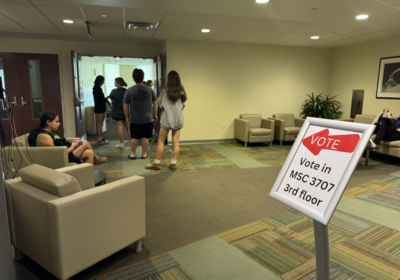Administration says you can ‘explore’ with Finish in Four, students disagree

The Finish in Four plan will only allow students to change their major if it will not delay their graduation. ORACLE FILE PHOTO
Students are taking to the Facebook class pages to express concerns about the legitimacy of USF’s four-year graduation plan. It all boils down to one mandate: the degree progression policy.
This policy was created in 2013 “to guide students to on-time degree completion without earned excess credit hours as defined by the state of Florida” and amended last year.
The outraged students are reacting to recent Finish in Four advertisements posted in the class pages last week and are claiming that advisors are preventing students from switching majors because of the policy.
Dean of Undergraduate Studies Paul Atchley addressed the claims in an interview with The Oracle.
“Students can change their major as long as they are able to complete their plan within the four-year timeframe that the taxpayers of the state of Florida have clearly mandated,” Atchley said. “If students can switch their major or add another degree and still be able to graduate on time, then it will be approved.”
A frequent concern that was brought up by students in the Facebook class pages was that the university is placing funding over the needs of students, especially to keep the university’s preeminence status.
“USF is not a cutthroat Ivy League school,” Alina Zhukova, a senior majoring in physics wrote in the class of 2021 page. “We’re supposed to serve our community. Throwing students under the bus just for higher ratings doesn’t reflect that.”
Atchley said the four-year graduation rates do correlate with the preeminence metrics.
“When students are graduating with less debt, that helps with maintaining preeminence,” Atchley said.
To Atchley’s point about student debt, information about the Finish in Four plan states that “each additional year could cost (students) nearly $60,000.” The breakdown to reach that number includes expenses like tuition, fees, supplies, housing and “unrealized income”.
USF has to meet 11 of the 12 preeminence metrics in order to retain its status as preeminent.
The twelfth metric requires at least a $500 million endowment and USF’s endowment has only $442 million.
A potential drop in the university’s four-year graduation rate would result in the loss of preeminence.
According to Christian Cavazos, a junior majoring in marketing, USF’s priority of funding is overshadowing a student’s ability to make decisions about their future.
“Yes, they are trying to create people who are going to be influential in the world, but at the same time, they are going after the money,” Cavazos said. “It’s really just money first and all the other cute ‘here’s your cap and gown, go Bulls’ stuff later.”
Cavazos said he believes the policy will limit a student’s option to explore other fields.
On the other hand, Atchley said even with the four-year plan, students can still do so.
“I am sympathetic to the idea that college is about exploration, it’s not out of the question,” Atchley said.
Director of the Office of Academic Advocacy Leslie Tod said the Finish in Four plan will provide guidance to prevent students from getting lost in their credits when they are trying to explore other options.
The Finish in Four plan, which is similarly based on the policy, was designed to give guidance and save students from paying extra tuition.
“Some students were showing they had an interest in other classes and not performing well in the ones they are already in,” Tod said. “The last thing we want is for a student getting so lost that it costs them extra expenses.”
Cavazos said the pressure to finish in four years does not account for students who have other obligations.
“I think the faculty knows that kids aren’t ready,” Cavazos said. “Students already know that it’s expected to graduate in four years, but now it feels like you’re being pushed out and like you have no choice.
“It creates a lot of stress.”
According to Atchley, students have graduated with honors, double majors and have studied abroad and were able to graduate on time.
“There are summer classes, winter sessions, maymesters that students can take in order to still finish in a timely manner,” Atchley said. “You can probably get three degrees if you tried really hard.”
Luna Canola, a sophomore majoring in public health, is a full-time student who is currently taking 15 credit hours and working 40-hour weeks.
“It’s doable, but you feel cornered,” Canola. “It feels like you’re running against time.”
According to the College Solution website, one-third of students change their major at least once during their college career.
Canola is an example of one of these students.
After finishing her credits in pre-nursing, she realized that it was not the career path for her. Canola consulted with her pre-nursing advisor and was told she couldn’t switch her major.
It doesn’t end there.
She said she then spoke to two more advisors in other departments and was turned away for a third time.
“My advisors told me that they believed in me because of my GPA but that the policy would prevent me from switching,” Canola said.
She was told that in order to switch her major, she would have to take a “smaller major” such as psychology or sociology in order to graduate in four years.
“If I switched, I was told I had to take two summer semesters and 18 credit hours each semester in order to catch up to the four-year mark,” Canola said.
Scared of losing her enrollment, Canola settled on taking psychology even though she had no interest in the major.
“It was awful,” Canola said. “I’ve never been so frustrated.”
Canola said she was prepared to finish a psychology degree and go back to school to obtain an additional degree in what she wanted. However, after her psychology advisor recognized her frustration, he allowed her to switch her major to her then minor, public health.
Tod said it is unlikely that a student will be approved to switch if they have not taken any credit hours in the new major, which was the case for Canola.
Atchley said, given the policy, students should not feel limited as long as they are following the four-year plan.
“This policy is allowing students to still explore other courses and majors that will provide them with careers that they will enjoy for the rest of their lives, but we have to really focus on the key components that make this possible,” Atchley said.







